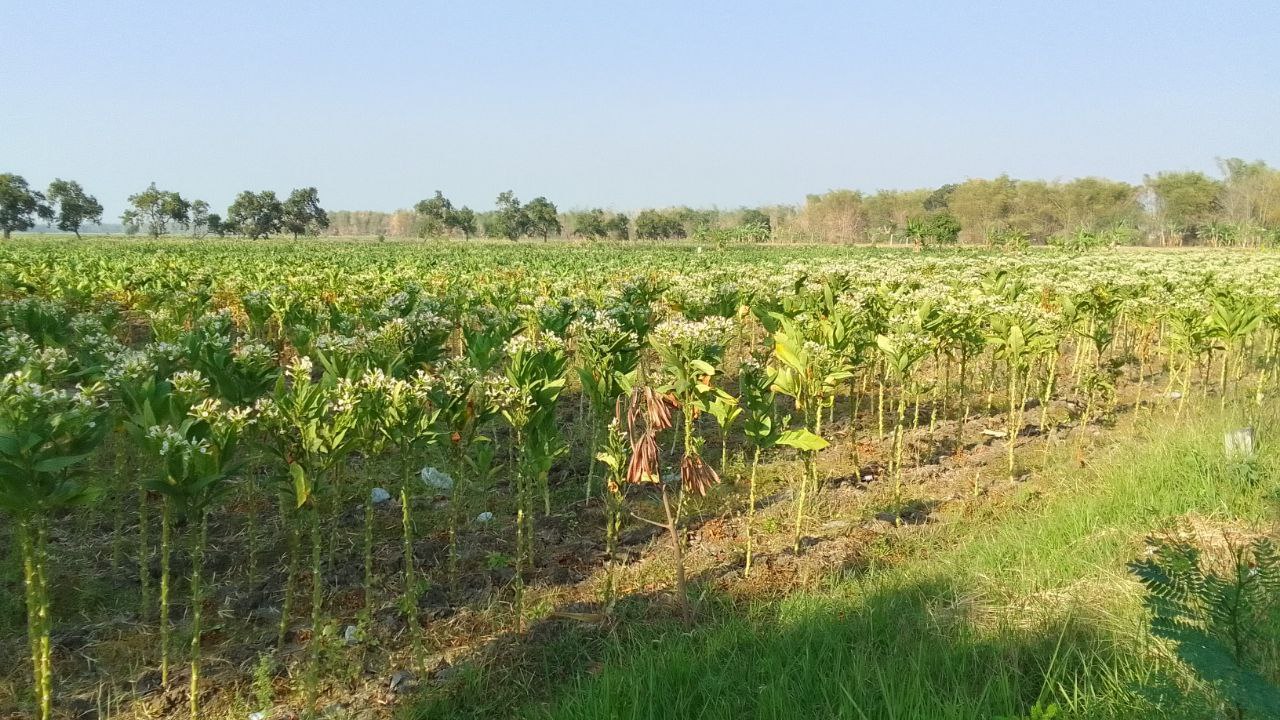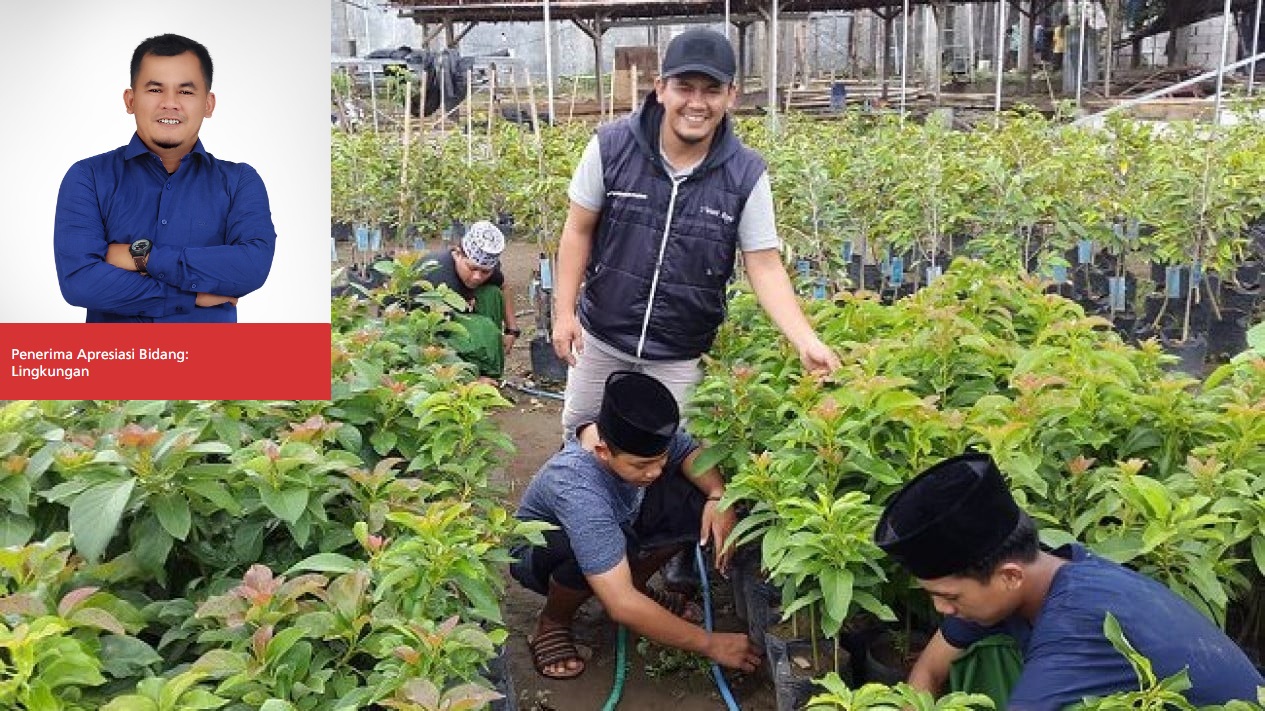Every time I go to Jombang, East Java, to visit my oldest son in a pesantren (Islamic boarding school), I always take several roads that are lined by rows of sorghum stalks in a cluster of fields. When spotting this plant, I instantly recalled my childhood memories. Back then, I would join my friends in sipping a stalk of sorghum given away by local farmers during harvest. It tasted strangely sweet with a rather astringent flavor, totally unlike sugar cane. But I couldn't help but rejoice in the seemingly trivial experience.
One day, on the way to the same pesantren, I pulled over and stopped for a moment only to observe the rare sorghum. I prefer calling it rare as there are no longer sorghum stalks I can find here in my hometown. The sight of the flowering plant has indulged me into an instant joy. However, deep down, I knew that this longing was actually a slight regret as this plant had lost its prestige as a staple food that ancient people used to consume, including villagers of mine.
 |
| Sorghum that may replace rice in Jombang (Personal doc) |
I couldn't thank Rizki Hamdani enough for his support in promoting the growth of sorghum in the area. Owing to his untiring effort, farmers in Jombang have benefited economically from the plant as well as gained assurance of alternative consumption to support food security in the future. What makes me even happier is the fact that more young people are fervent to be farmers which millennials alike have seemed unenthusiastic about becoming.
In honor of his hard work and perseverance, Rizki was presented with the 11th Satu Indonesia Awards in 2020 by PT Astra International, Tbk. He was considered successful in inspiring young people to grow interest in farming by founding a group called Kelompok Santri Tani Millenial. The name of the group includes three main words: santri (students in Islamic boarding school), tani (farming), and millennial which indicates the involvement of the young generation. With the group, Rizki has proven that santris should not be entirely dependent on parents while focusing only on religious studies.
 |
| Rizki's hard work finally paid off. (Photo credit: Satu Indonesia) |
Successful farmers are possible
After learning that the young generation's perception of agriculture and animal husbandry has been negative, that being a farmer is not profitable, Rizki Hamdani is then determined to convince them that these two professions actually promise good income. Rizki commenced a program at Pondok Fathul Ulum because this pesantren did not have formal education, unlike other modern Islamic boarding schools. His program is special because it encourages santris to embrace entrepreneurship through sustainable farming on the basis of eco-friendliness.
He chose Jombang since he's married to Silvia Nur Rochmah, a local woman with whom he lives permanently after resigning from his job in Jakarta. Rizki is actually an Acehnese but decided to do something for people in the city known as Kota Santri. In the new city, he started his own venture of cultivating catfish which proved to go very well.
While running the business, he had the opportunity to tour the area where he lives and witnessed the shocking fact that agriculture had become less favorable to younger people due to the lack of regeneration. It is undeniable that farming is not an ideal profession. Whereas the production cost is increasing, the profit made from harvest is decreasing. Not to mention that being a farmer is normally associated with a filthy look instead of an attractive appearance like that of an office employee.
As far as Rizki is concerned, it is dangerous to let the phenomenon take place. If young people are not encouraged to love and do farming—simply thinking this is a lowly and unprofitable job—that they choose to work as employees or factory laborers, then we must be prepared for food shortage sooner or later. That is what Rizki is concerned about. We have so far relied primarily on farming for food to help us sustain our lives. When no one is interested in farming, what can we possibly expect to have in the future?
 |
| Rizki and his students when feeding catfish (Photo credit: Kukuh Bhimo Nugroho) |
And his fate was sealed when he met some students of Pondok Pesantren Fathul Ulum known as Pondok Gerdu Laut. They often paid him a friendly visit and finally developed a connection so strong that he's willing to help them with their catfish farming. It just so happened that those students were also raising catfish in their pesantren. With Rizki onboard and the approval of Mr. Ahmad Habibul Amin (the school director), they were confident to thrive in the business.
Going together like a horse and a carriage
Since the first meeting in 2016 with Rizki, Mr. Amin had grown no doubt that this young man from Bireuen would make a perfect partner to make his santris advance. In the collaboration, Rizki is required to help the students in the pesantren to develop their entrepreneurial skills in what Mr. Amin had started on the premises. A Javanese expression, tumbu oleh tutup, may best describe Mr. Amin and Rizki's partnership. They go together like a horse and a carriage: the first works on education and the latter on entrepreneurship.
 |
| Mr. Amin (in black cap) and Rizki on a mutual partnership (Photo credit: Kukuh Bhimo Nugroho) |
Mr. Amin is fully aware that his traditional pesantren needs someone outside the organization to help 340 male and female students undertake business ventures. With Rizki's experience and competence, the students will be able to learn how to run a business including risk management. Since then has he become an unofficial consultant for Fathul Ulum students who gained valuable insight and important lessons about tenacity and integrity.
Rizki pointed out that there are numerous pesantrens in Indonesia, and Jombang in particular, so we have ample opportunity to promote farmer regeneration. Each region across the archipelago has enormous potential for economic development. That being the case, students in those pesantrens need to be encouraged to cultivate local resources while strengthening agricultural concepts in a more systematic way.
The synergy between Rizki and Mr. Amin has led them to a fulfilling reward. The pesantren located in Puton, Diwek sub-district was initiated into a program called Desa Sejahtera Astra (Astra Prosperous Villages). Abbreviated as DSA, this initiative manifests a sustainable program under the auspices of PT Astra International, Tbk. Part of the company's CSR, the DSA program aims to advance four main pillars, including Astra Sehat (health), Astra Hijau (environment), Astra Cerdas (education), and Astra Kreatif (entrepreneurship). Villages and communities alike can expect to be prosperous in the DSA, just like Pondok Fathul Ulum.
On Integrated Farming System
While it was not anticipated, the santripreneur and pesantrenpreneur program has also scored a meaningful success when Fathul Ulum won third place in the 2019 KBANNOVATION that adopted ”Inovasi Kita, Inspirasi Negeri” (Our Innovation Inspires the Nation) as the theme.
With every progress they make, Rizki got even more committed to devising a concept of santripreneur and pesantrenpreneur to make the students embrace entrepreneurial skills and the pesantren be economically empowered. More to the point, Rizki made it clear to include sociopreneurs in the program with hopes that students' business activities will benefit people living in the immediate vicinity of the pesantren.
That is what sparked the making of a business group named Kelompok Santri Tani Milenial (KTSM) in Fathul Ulum. In conjunction with the pesantren, Rizki has been determined to launch a program of eco-friendly farming known as the Integrated Farming System/IFS). In this system, KTSM combines agriculture, fishery, husbandry, and the environment.

Producing organic fertilizers means saving money and making soil healthy. (Photo credit: Kukuh Bhimo Nugroho)
For instance, waste from the catfish ponds is channeled to fertilize the plants they grow. In addition, they chop sorghum stalks to feed the livestock. This waste processing provides valuable benefits in terms of environmental care and economic empowerment. Not only are organic fertilizers and manure good for the soil, but also save money hence supporting the pesantren's financial independence.
Continuous support
With an area of 2,5 hectares, the pesantren allows the students to currently raise 250 broiler ducks, 30 goats, 16 beef cattle, and a variety of fish in 40 biofloc ponds. Some santris also grow tomatoes, chilies, eggplants, cabbage, durian and sengon nurseries. They normally work two hours in the morning before the class and two more hours in the afternoon. This way they learn the habit of working in addition to religious studies.
Finally, when they graduate one day, they will receive some money to aid their business venture. Whatever business they may embark on, the KSTM will fully support them financially and provide them with the necessary skills. Rizki and Mr. Amin would like to see santris reigning to society with economic independence, not the other way around.

Being economically productive is good for santris. (Photo credit: Ponpes Fathul Ulum)
They must develop self-confidence and self-worth as proud santris who can contribute spiritually and economically to the society where they live. Mr. Amin feels obliged to ensure that his students are economically independent so that they would not trade their teaching or preaching for money. Getting paid for what they teach or preach is fine, but charging particular rates for any religious service would be abominable.
From Rizki Hamdani we learn that students in pesantren do not necessarily end up a burden to their parents when returning home and focusing only on teaching Islamic values to the society. They have the same privilege to thrive financially from any business enterprises they have undertaken since their stay in the boarding school. Rizki has also taught us that farming is still promising and that local treasures, such as sorghum, can help us sustain today's life and assure food security in the future for our beloved Indonesia.







Tidak ada komentar:
Posting Komentar